There’s a magical moment when you receive an unexpected gift—the anticipation, the wonder, the child-like joy that fills your heart. No matter who you are, where you’re from, what language you speak — this is a universal human experience.
A tradition as old as time, gift-giving is a practice that has shaped cultures for centuries. But why do we give gifts? And do they really work?
We’re so glad you asked! Join us as we dive deep into the psychology of gift-giving — we’re going to explore the science, unravel the motivations, and uncover the impact it has on our relationships. In this post, we’re especially focusing on gifting in professional settings and how it affects business relationships and outcomes.
Ready? Let’s dive in!
Why Do We Give Gifts?
Gift-giving is a practice deeply ingrained in human culture, spanning thousands of years and throughout cultures and societies of all kinds. It’s no coincidence that gift-giving is actually good for us — both mentally and socially!
As far as what motivates us to want to give (or receive) a gift, there are a bunch of psychological theories and concepts. Here are a few:

Altruism
When people give gifts, they experience a sense of fulfillment and well-being, while strengthening their relationship with the recipient.

Impression Management
Gift-giving can be used as a way to enhance our personal image and create a positive perception of ourselves in the eyes of others.

Reciprocity
When someone receives a gift, they feel obligated to reciprocate the gesture in some way — which helps us maintain balance and harmony.

Relationship Maintenance
Gifts are powerful tools in conveying emotions — they can serve as tangible symbols of appreciation and are affective in helping us maintain meaningful relationships.
Those are just some of the theories behind what motivates us to give gifts. Of course, people experience different motivations depending on the reason behind the gift, their relationship with the recipient, and even cultural norms and traditions can play a role.
But what is it about gifting that is so effective? Why has it perpetuated over time? Let’s take a deeper look:
Gifts Evoke Positive Emotions
Did you know that when we give and receive gifts, feel-good chemicals are released in our brain? It’s true! We experience a release of serotonin, dopamine, and oxytocin — a combination that is often referred to as a “helper’s high” — because it makes us feel good!
The Cleveland Clinic reports that this uplifting physiological response not only contributes to lower blood pressure and increased self-esteem, but also plays a crucial role in reducing feelings of depression.
Another emotion we often experience during a gifting exchange comes from the element of anticipation. When we get a gift, just the anticipation of receiving something positive sets off our brain’s reward system, releasing a surge of dopamine — the chemical associated with pleasure and motivation. This makes gift-giving an overwhelmingly joyful experience.
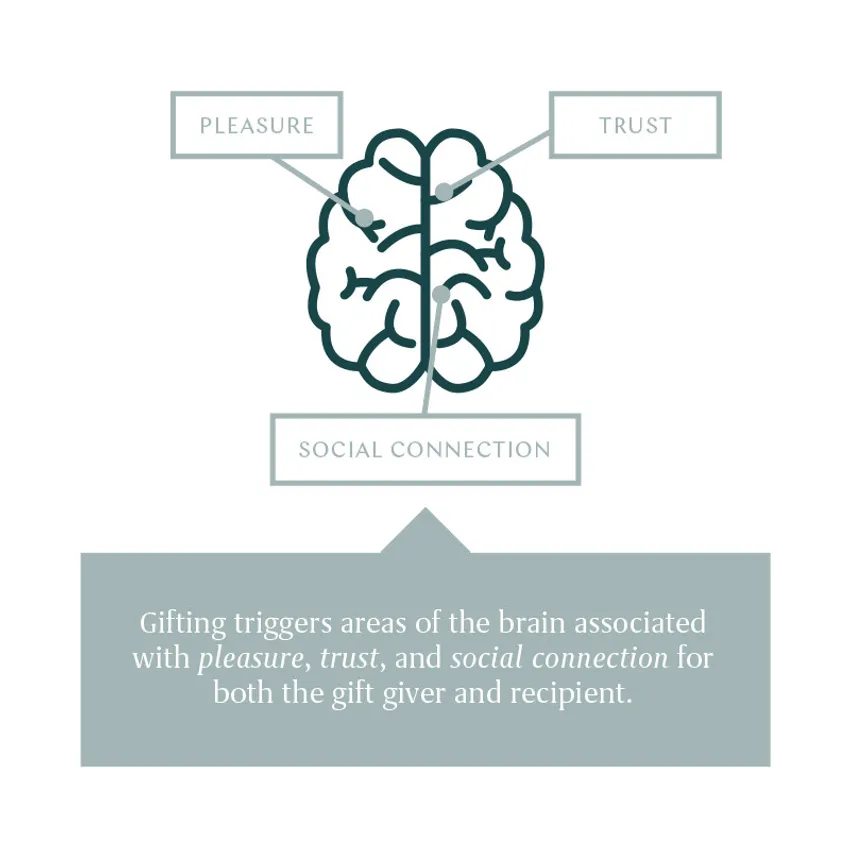
Gifts Help Improve Relationships
Gift-giving is a social gesture, usually for the purpose of expressing appreciation. This simple act is super effective at strengthening social bonds and deepening our sense of connection to one another.
A recent study from Florida State University found that expressing gratitude to a close friend or colleague strengthens our sense of connection to that person. These exchanges promote a sense of trust and cooperation that strengthens our ties to others. Plus, it doesn’t hurt that positive social interactions like this are linked to good mental and physical health!
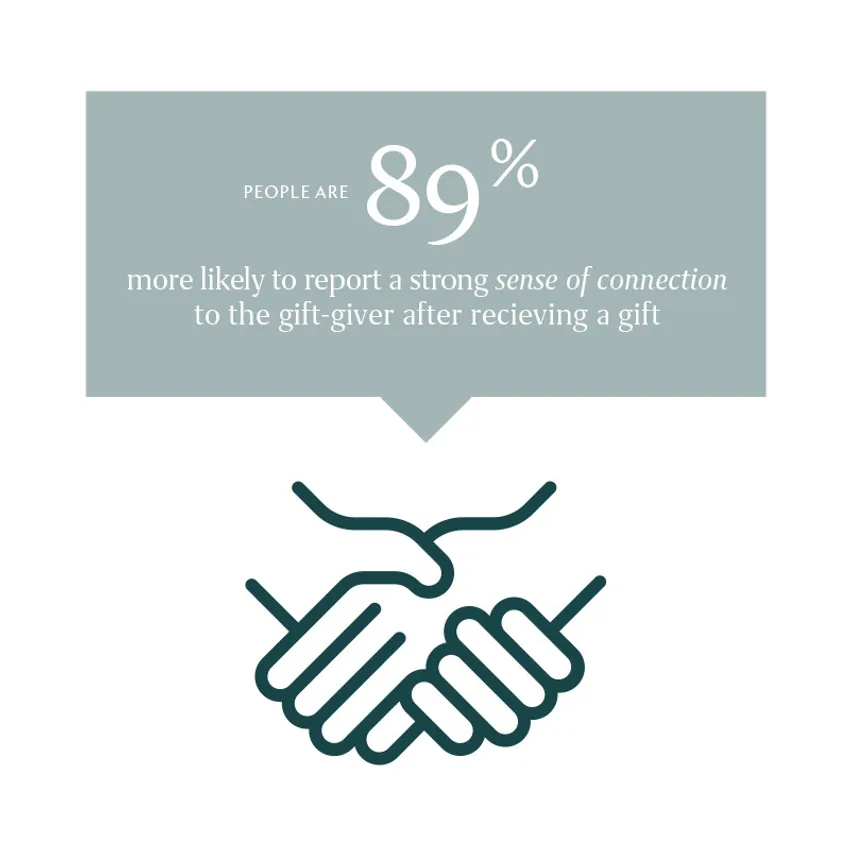
Gifts Create Lasting Memories
Gifts do more than just make us feel happy in the moment – they also help us create lasting memories! Our brain’s memory center, called the hippocampus, plays a big role in this.
When we receive a meaningful gift, the positive emotions we feel get linked to the gift in our minds. So, whenever we see or think about that gift, it brings back those feelings of care, appreciation, and the cherished moment shared with the giver of the gift.
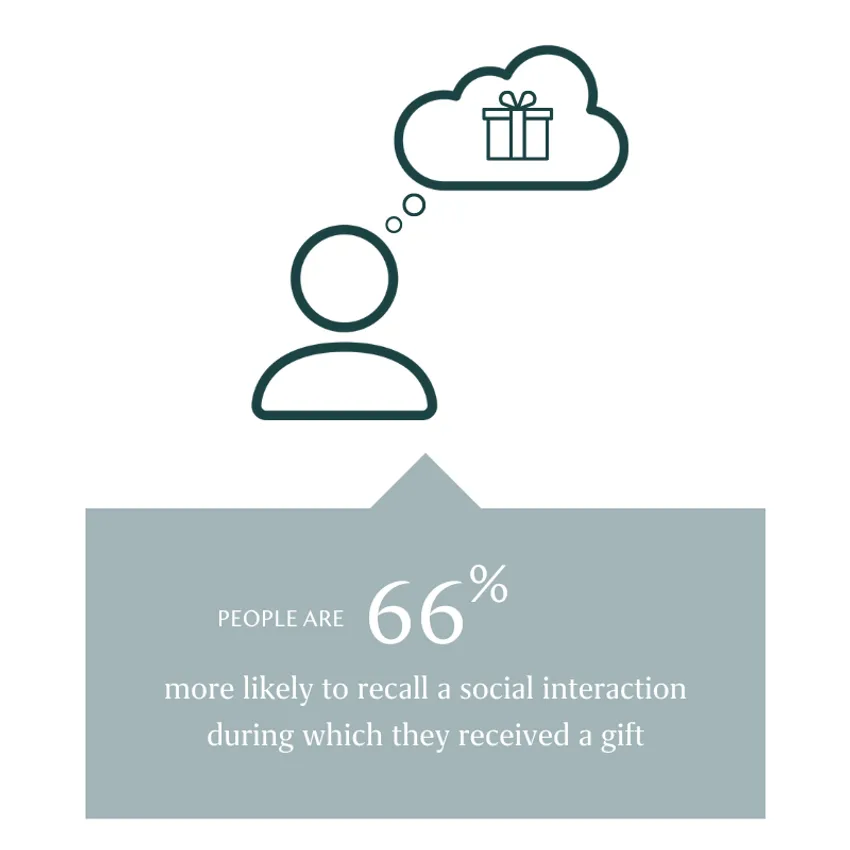
How Gifts Influence Business Outcomes
In our personal lives, gift-giving often comes naturally. We give gifts to our loved ones to show appreciation, celebrate special occasions, or as a way to show them we were thinking of them.
But, corporate gifting is a whole different ball game. While the purpose is still to express appreciation and connect with others, there are specific corporate gifting dos and donts to follow that are unique to a professional setting.
Whether it’s client gifting or employee gifting or whatever it may be — gifting in the corporate world is typically more of a strategic move to win hearts and keep the business wheel spinning smoothly.
So, do gifts work? How does gift-giving actually influence business outcomes?
Gifts and Reciprocity
How are people influenced to make decisions in the first place? According to Robert Cialdini, it’s all about the Principles of Persuasion — specifically, the concept of reciprocity.
Reciprocity refers to the idea that when someone does something for us or gives us something, we feel obligated to return the favor. This is especially true for gift-giving — we are hard-wired to respond positively to a gift, even if we didn’t ask for it — or even want it! We automatically feel indebted to the giver, regardless (Forbes).
This is what makes gifting such a powerful business tool! By offering something valuable upfront, like free resources or gifts, companies can create a feeling of goodwill and indebtedness in their customers, making them more likely to show their appreciation to the business in return — whether it’s through purchases, loyalty, or referrals.
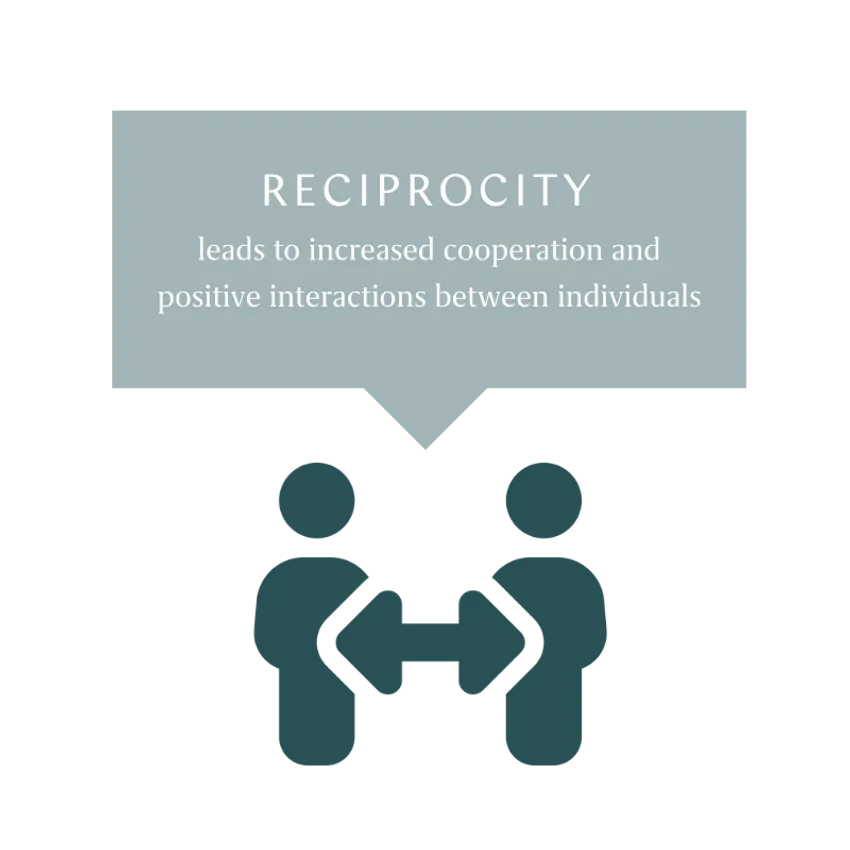
Gifts Improve Cooperation
Researchers Michela Balconi and Giulia Fronda found that giving gifts can seriously work wonders in boosting cooperation, strengthening social bonds, and enhancing behavioral performance in social settings.
They call this “the gift effect” — basically, their theory is that simple acts of kindness and generosity can have far-reaching, positive consequences in building a harmonious and productive social environment.
Given that strong relationships and cooperation are crucial for success, this research suggests thoughtful gifting is important for fostering meaningful connections — leading to long-lasting, win-win business relationships!
So, next time you’re thinking about making those connections shine, consider sprinkling some thoughtful corporate gifts into the mix. You’ll be amazed at the difference it makes!
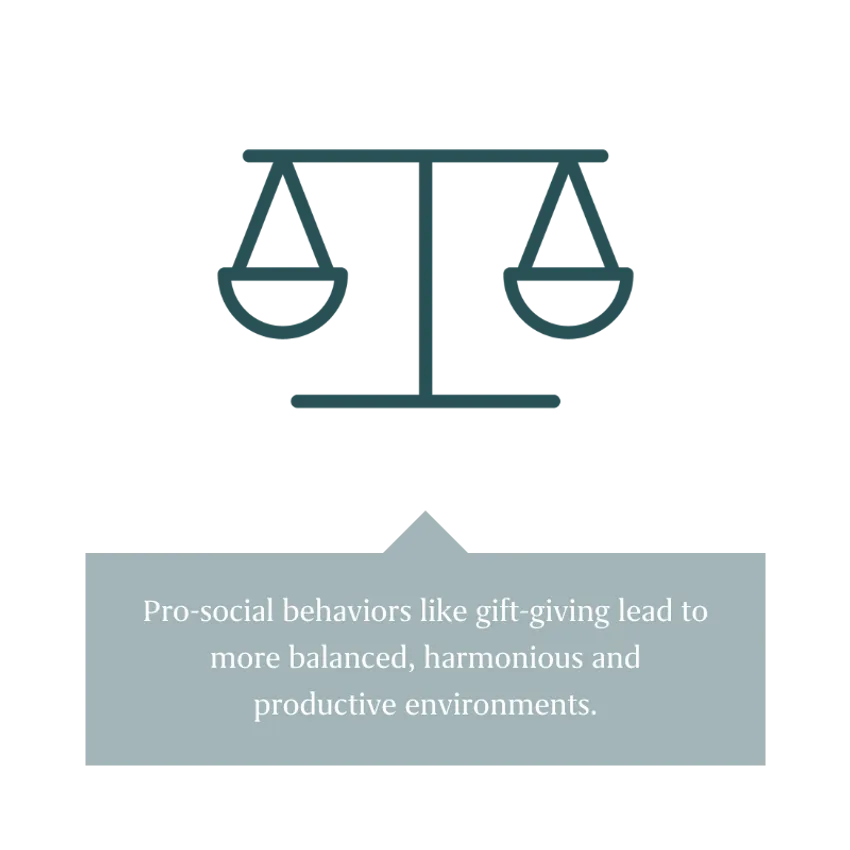
Gifts and Appreciation
Did you know that companies that have a strong culture rooted in appreciation earn 4x the annual revenue of their competitors? And what better way to show your clients and employees you appreciate them than with an awesome gift?
It’s a no-brainer: when companies show real gratitude to their clients, it makes them stick around, keeps them coming back for more, and they even spread the word to their buddies. And when employees feel appreciated, they become super engaged and motivated — spreading good vibes all around!
Plus, studies have shown that receiving a gift can evoke feelings of gratitude, an emotion that areas in the brain associated with reward and social cognition. This leads to a positive feedback loop that reinforces social bonds and encourages further prosocial behaviors — like teamwork and cooperation!
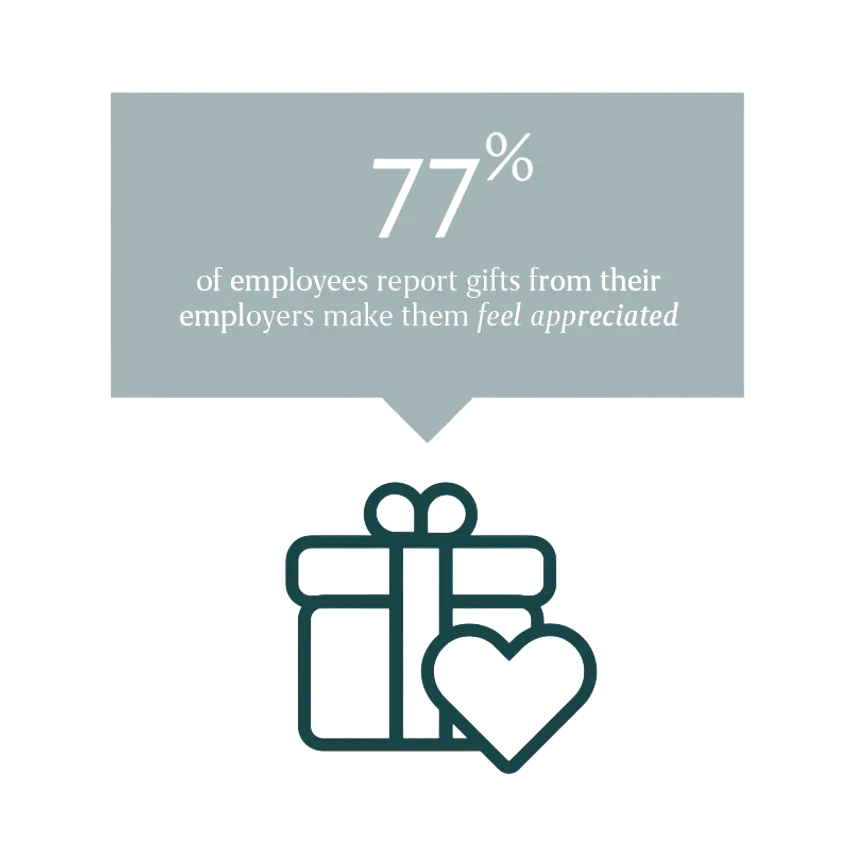
Business Gifting Leads to Increase Response Rate and ROI
Gift-giving in business settings can be a total game-changer for your company, boosting response rates and ROI. Not convinced? Well, consider this:
Two researchers at Princeton University conducted a study about snap judgments and first impressions. They wanted to see if just being around someone, without any interaction, affected how people judged them. The findings? Time spent didn’t change the judgment itself, but it did make the observer more confident about their judgment.
This can be compared to the saying “judging a book by its cover”. So, let’s think about it in terms of gifting: When you send a gift to someone, it serves as a physical representation of you — and will cause the recipient to think of you and judge you — even though you’re not physically there with them.
Gifts serve as a great opportunity to “get in front of someone,” figuratively speaking. And this journey is a familiar one: the gift itself triggers awareness, the detail in the gift sparks interest, and the emotion leads to a decision, then finally, conversion — resulting in a positive ROI.
Strategic Gift-Giving as a Business Tool
In our digitally-saturated world, it can be extra challenging for companies to humanize their customer experience and create meaningful connections when their services and interactions mostly take place on screens.
This means businesses need to be more strategic when it comes to how they connect with their prospects, clients, and employees. We hate to break it to you, but emails just don’t cut it anymore. This is where strategic gifting comes in to play.
If you find yourself thinking “I’m not sure if a gift will really do anything…”, we totally get it. This is a totally natural human assumption — in fact, behavioral science studies suggest that gift-givers often underestimate how much impact the gift will have on the recipient.
But picture this: one of your awesome sales execs sends a kickass email to Prospect A — but it gets lost in an endless flood of emails. Womp, womp. But when your other sales executive sends an impressive email to Prospect A — with a subject line that says, “Hey, you got a gift!” and also throws in a link to a sweet gift and a personalized note. Boom! Prospect A opens the email, claims their gift, and is super intrigued.
And guess what? They’re also much more likely to respond! In fact, studies show that people are 3.5x more likely to book a meeting after receiving a gift.
By incorporating gift-giving into overall business strategy, companies can leverage the psychology of gift-giving to their advantage. Whether you’re nurturing existing relationships or creating new connections, gifts are a powerful business tool to have in your back pocket!
Tips for Creating a Positive Gift-Giving Experience
Physical Gifts >
Digital Gifts
People value things they can see and touch almost 30% more than things they can only see. When possible, give your recipient a physical gift — it provides a much more meaningful and memorable experience for the recipient.
Use the Element
of Surprise
Unexpected gifts evoke a stronger emotional response. The element of surprise triggers a combination of emotions such as joy, excitement, and gratitude, which can enhance the overall gift-giving experience.
Create an Experience
Research has shown that gifts that are designed around a specific experience can bring you and the recipient closer — even if you don’t directly experience the gift with your recipient.
Psychology of Giving Gifts: Wrapping It Up
Gift-giving is rooted in a mix of psychology and tradition, and it’s proven to have a BIG impact on personal relationships and even professional dynamics.
As we discussed throughout this blog post, there are many motivating factors behind gift-giving: from altruism to reciprocity to managing our social image — all of it plays a role in strengthening our social connections.
What’s even more fascinating is the effects that giving and receiving gifts has on our brain — releasing chemicals that trigger positive emotions and make us feel good, both physically and mentally! And these strong emotional responses affect our behaviors even more than we realize.
In the business world, gift-giving can be a really powerful tool! By understanding the psychology of gifting, companies can leverage gifts to boost cooperation, enhance the customer journey, strengthen relationships with employees, and ultimately, achieve stronger business outcomes (cha-chiiing!)
All that is to say, gifts have proven their significance in almost all facets of our lives: culturally, socially, professionally, emotionally… after all, gift-giving is a universal experience.
By understanding the psychology of gift-giving, we can appreciate how gifts really are a conduit for emotions, a way to create lasting memories, and a bridge that strengthens the bonds between us all.
Written by Molly Ledwith. Updated Aug. 2023.

